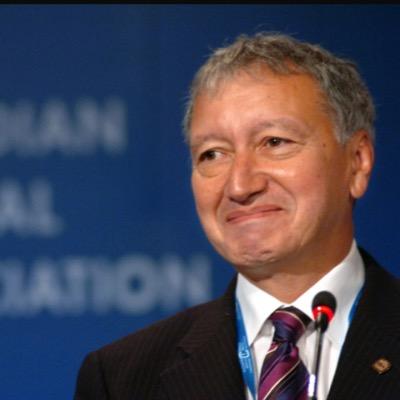
Dr. Brian Day
@DrBrianDay 
- Past President Canadian Medical Association
- Past President Arthroscopy Association of North America
- Honourary Associate Professor University of British Columbia
- 2014 Doctors of BC Don Rix Leadership Award


By Pamela Fayerman
A Kelowna boy who became a paraplegic because of complications from a long-delayed spine operation is supporting four other patients in a lawsuit against the B.C. government launched by private clinic owner Dr. Brian Day.
An affidavit by Walid Khalfallah's mother, Debbie Waitkus, a nurse, was filed in B.C. Supreme Court on behalf of the 16-year-old boy. He had the 10-hour surgery in January at a Shriners Hospital in Spokane after waiting two and a half years from his first appointment to his surgery date at B.C. Children's Hospital.
It's unknown if paralysis would have occurred if he'd had the operation to help correct his severe scoliosis in Vancouver, but health minister Margaret MacDiarmid has recently apologized, saying she was "sincerely sorry for not only this family but for any family that waits this long."
The case has triggered several changes at the hospital — including the planned hiring of another orthopedic surgeon and better communication — after an unusually hard-hitting report from the Patient Care Quality Review Board (PCQRB) found that Khalfallah did not receive quality care and that treatment delays allowed his condition to unnecessarily deteriorate, increasing risk to his health. The report criticizes the surgeon, hospital and Provincial Health Services Authority (PHSA) for, among other things, not meeting national and provincial surgery access targets, not following provincial and internal policies meant to flag cases that have waited too long, not properly communicating with the family and not having better methods for scheduling urgent consultations.
The "unreasonable" delays in the Khalfallah case tallied 30 months in total (from first appointment to date of surgery), 10 times as long as national clinical guidelines say patients in such condition should wait for surgical intervention.
Waitkus said in an interview that she joined the suit by Day, co-owner of the Cambie Surgery Centre and Specialist Referral Clinic, because her son has "lost so much" and his treatment in the public system convinced her that when the public system is too overwhelmed, timely options and alternatives should be available to patients — whether in the private system or outside the country.
The review board report says when there are long waits for care at Children's Hospital, families should be linked to timely alternative options. "This is a clear responsibility of a patient-centred ethical health care system," states the report, signed by Dr. John Chritchley, chairman of the PHSA review board.
In response to the report, PHSA board chairman Wynne Powell sent a letter to Chritchley and the B.C. government stating that waiting lists could be reduced if the care of some young adult patients (over the age of 15) is transferred to other hospitals when appropriate.
As well, Powell promised the hospital will provide patients with out-of-province and out-of-country care options. The health ministry has the power to approve out-of-country care when delays in B.C. are life-threatening or likely to result in irreversible organ or tissue damage. But it was only after Waitkus informed BCCH orthopedic surgeon Dr. Christopher Reilly that she was taking her son to Spokane that alternatives ever came up.
Day's lawsuit against the Medical Services Commission, the Minister of Health and the Attorney General contends the Charter of Rights and Freedoms gives patients the right to seek expedited care in the private system, just as preferred beneficiaries are allowed to do. Preferred beneficiaries include injured WorkSafeBC claimants, RCMP officers, federal prisoners and armed forces members.
No date has been set for a trial.
Khalfallah was 13 in June 2009 when he was first referred on an urgent basis to Reilly, head of orthopedics. He wasn't seen until more than a year later, when Reilly claimed — according to the affidavit filed by Waitkus — that he never saw two referrals from the Kelowna pediatrician who made them, nor X-rays showing a 100-degree curvature. (A normal spine bends up to about 45 degrees in the upper back area).
Although Reilly explained that the surgery was necessary, complex and risky, he advised there was a two-year waiting list since there are only two surgeons who do such work at Children's Hospital (a third is coming next year). There are now 133 patients waiting for spine surgery, 50 fewer than last year. At a second visit several months later, Khalfallah's condition was worse and he was supposedly put on an urgent surgery list.
But in mid-2011, Waitkus still didn't have a surgery date, so she made her own arrangements to take her son to Spokane to have the surgery and pre-op traction at Shriner's International Hospital. By the time Reilly offered a surgery date of Nov. 27, 2011, Waitkus was already booked at the U.S. hospital, where the operation was done free on a compassionate basis (in January 2012).
Waitkus said she complained in the summer of 2011 to the Interior Health Authority's Patient Care Quality Office and to then-health minister Mike de Jong, expressing her anger, disillusionment and disgust over the way her son's care had been handled.
The plaintiffs in the Day lawsuit are two students, a cancer survivor and a terminally ill cancer patient, all of whom suffered long waits in the public system.
"B.C. effectively imposes the death penalty on patients through its policy of rationed care," Day has said, noting that in a landmark 2005 Quebec case (Chaoulli) the Supreme Court of Canada stated: "The evidence shows that delays in the public health care system are widespread and patients die as a result of waiting lists for public health care."